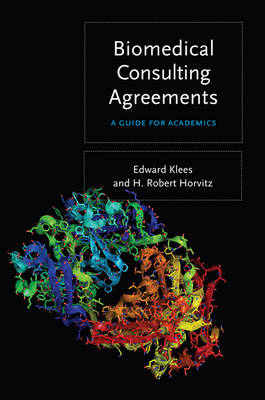
Biomedical Consulting Agreements
A Guide for Academics
Seiten
2012
MIT Press (Verlag)
978-0-262-51793-5 (ISBN)
MIT Press (Verlag)
978-0-262-51793-5 (ISBN)
- Keine Verlagsinformationen verfügbar
- Artikel merken
An attorney and a scientist outline issues that arise in biomedical consulting agreements, including institutional obligations, confidentiality, consulting fees, stock, and options.
There can be a clash of cultures when academic scientists negotiate consulting agreements with biotechnology or pharmaceutical companies. Scientists, accustomed to the collegial atmosphere of the laboratory and sometimes disdainful of legal paperwork, might be less than diligent in reading the fine print. On the other hand, a company--motivated to protect discoveries and trade secrets--might write provisions that are favorable to its interests, leaving it to the scientist to raise objections or offer a counterproposal. The scientist, meanwhile, might believe that it would be impolite or antagonistic to raise questions about a company's agreement.
This book offers an essential guide for academic scientists and physicians who are considering consulting work in the field of biomedicine. In it, the authors--an attorney and a Nobel Laureate in Medicine, both with extensive experience reviewing and negotiating consulting agreements--outline key issues to consider before signing a consulting agreement. These issues range from the obvious--intellectual property, confidentiality, and fees--to those that might not spring immediately to mind, including indemnity, different classes of stock, and the relevance of insider trading and securities laws.
There can be a clash of cultures when academic scientists negotiate consulting agreements with biotechnology or pharmaceutical companies. Scientists, accustomed to the collegial atmosphere of the laboratory and sometimes disdainful of legal paperwork, might be less than diligent in reading the fine print. On the other hand, a company--motivated to protect discoveries and trade secrets--might write provisions that are favorable to its interests, leaving it to the scientist to raise objections or offer a counterproposal. The scientist, meanwhile, might believe that it would be impolite or antagonistic to raise questions about a company's agreement.
This book offers an essential guide for academic scientists and physicians who are considering consulting work in the field of biomedicine. In it, the authors--an attorney and a Nobel Laureate in Medicine, both with extensive experience reviewing and negotiating consulting agreements--outline key issues to consider before signing a consulting agreement. These issues range from the obvious--intellectual property, confidentiality, and fees--to those that might not spring immediately to mind, including indemnity, different classes of stock, and the relevance of insider trading and securities laws.
Edward Klees is General Counsel at the University of Virginia Investment Management Company and was formerly Associate General Counsel of the Howard Hughes Medical Institute. H. Robert Horvitz, 2002 Nobel Laureate in Physiology or Medicine, is Professor in the Department of Biology and a member of the McGovern Institute for Brain Research and of the Koch Institute for Integrative Cancer Research at MIT and an Investigator at the Howard Hughes Medical Institute.
| Verlagsort | Cambridge, Mass. |
|---|---|
| Sprache | englisch |
| Themenwelt | Medizin / Pharmazie ► Physiotherapie / Ergotherapie ► Orthopädie |
| Recht / Steuern ► EU / Internationales Recht | |
| Recht / Steuern ► Privatrecht / Bürgerliches Recht ► Medizinrecht | |
| Technik ► Medizintechnik | |
| Technik ► Umwelttechnik / Biotechnologie | |
| ISBN-10 | 0-262-51793-0 / 0262517930 |
| ISBN-13 | 978-0-262-51793-5 / 9780262517935 |
| Zustand | Neuware |
| Haben Sie eine Frage zum Produkt? |
Mehr entdecken
aus dem Bereich
aus dem Bereich
Spiraldynamik - programmierte Therapie für konkrete Resultate
Buch | Hardcover (2021)
Thieme (Verlag)
CHF 146,95


